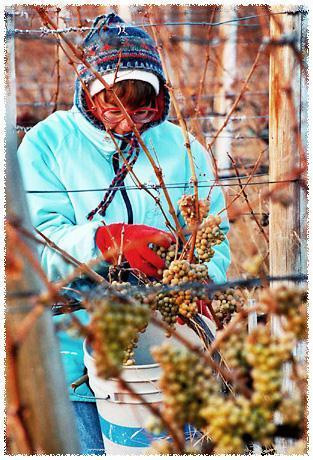St.

Catharines, ON - October 21, 2003 - As a result of the warm weather in early October, there has been a return of Asian ladybugs in South Western Ontario. While the volume of the Asian ladybugs is substantially lower than the levels experienced in 2001, Ontario wineries have taken immediate action and aggressive steps throughout the harvest to ensure that the quality of the 2003 vintage is maintained. A joint meeting of the Wine Council of Ontario and Grape Growers of Ontario resulted in a common approach that is being used to manage this year's situation.
In 2001, uncharacteristic levels of pyrazine, a harmless natural substance found in food and wine, were detected in some wines affecting the wines' desired taste and aroma. Industry researchers linked the higher than usual level of pyrazine to the unusually high population of ladybugs, here in search of their food source, aphids, which were abundant in the province at that time. There is no health risk associated with pyrazine. The industry withheld over a million litres of wine from sale in 2001 to uphold its commitment to produce only the highest quality wine for consumers.
"This brief reappearance of Asian ladybugs is no where near the levels experienced in 2001," said Linda Franklin, President of the Wine Council of Ontario. "Across the board, Ontario wineries have responded quickly to this year's circumstances, implementing learnings from 2001 and extensive inspection procedures throughout the harvest that we are confident will maintain the quality of the 2003 vintage."
As the 2003 harvest continues, wineries are inspecting vineyards with their growers, handpicking grapes and inspecting them at the winery before they are accepted for processing, and refusing loads of grapes that contain ladybugs. The Grape Growers of Ontario and Brock University have collaborated to prepare advisories for growers and are offering advice to growers on how best to manage this issue in the vineyard. Grape Growers of Ontario Chairman Ray Duc is confident "a common research program and support from all partners in the grape industry will equip Ontario growers with the right knowledge to manage this insect issue."
"In 2001, the industry was confronted with this situation for the first time and, from that experience, we have been able to research and develop vineyard protocols, like the inspection methods being used this year, to ensure maximum effectiveness in managing agricultural issues that face our industry," said Franklin. "This means we can continue to produce the highest quality products for consumers to enjoy."
Asian ladybugs have been used as a natural pest control for several decades in North American agricultural industries.

 quicksearch
quicksearch





